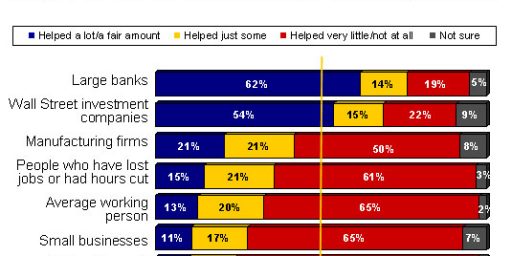More on Fiscal Policy
In my post on fiscal policy and why it tends not to be so great at working to counter-act a recession there was extensive discussion on why. Although I laid out the case for crowding out as one of the reasons this was met with considerable skepticism. In a rather nicely timed post we have Greg Mankiw summarizing several studies on this very topic.
The Keynesian model has some clear, practical insights about how to think about fiscal policy during economic downturns. But are those insights true?
One approach to answering this question is to examine the data using the techniques of time-series econometrics without imposing much a priori theory. For monetary policy, there is a large literature that does this; for fiscal policy, the literature is smaller but growing. The results from this exercise, however, do not always confirm the predictions from textbook Keynesian models.
For example, here is the conclusion of Andrew Mountford and Harald Uhlig (a prominent econometrician now at the University of Chicago) in an empirical study called “What are the Effects of Fiscal Policy Shocks?“:
Our main results are that
- a surprise deficit-financed tax cut is the best fiscal policy to stimulate the economy
- a deficit[-financed government] spending shock weakly stimulates the economy.
- government spending shocks crowd out both residential and non-residential investment without causing interest rates to rise.
These finding are not consistent with standard Keynesian theory, according to which government spending multipliers are larger than tax multipliers and crowding out occurs through increases in interest rates.
An earlier, related paper by Olivier Blanchard and Roberto Perotti called “An Empirical Characterization Of The Dynamic Effects Of Changes In Government Spending And Taxes On Output” reported similar anomalous results:
we find that both increases in taxes and increases in government spending have a strong negative effect on private investment spending. This effect is consistent with a neoclassical model with distortionary taxes, but more difficult to reconcile with Keynesian theory: while agnostic about the sign, Keynesian theory predicts opposite effects of tax and spending increases on private investment. This does not appear to be the case.
Blanchard, incidentally, is now the chief economist at the IMF.
Mankiw is a bit circumspect in that he isn’t sure how to convinced he is by the results. However, he does offer a word of caution in purusing Keynesian policies since the above indicates that they could have effects that are not desired.






Marginal Revolution also has their take. I started off sort of with my “who do I believe” vibe, but was surprised at the general level of discontent with the economics profession:
Greg Mankiw writes my post for me
(But certainly let’s kill stupid things like the Mars mission.)
Steve I take it your point is that having people remain unemployed from private sector jobs is far superior than having people work at deficit financed jobs if we want to grow our economy out of a recession.
Ken,
That was just stupid.
No…make that stooopid.
Yes, I really want people to be unemployed because I’m such a misanthrope I can’t stand the idea of an economic expansion and people living better lives.
Go sit in the corner.
No, ken. His point is that empirical results matter in figuring out what’s the best policy and that empirical evidence only supports the Keynesian multiplier weakly.
Without the effect of the Keynesian multiplier, stimulating the economy with federal expenditures is just spinning our wheels; it doesn’t produce the desired effect.
That’s why my position, for example, is that, if you’re bound and determined to have a stimulus program, the right stimulus program is extending unemployment benefits and increasing food stamps since that money is the most likely to get back into the general economy in the timeframe needed for the effect.
Steve amplifies that point by noting that if you really want to stimulate the economy a surprise tax-cut is more efficient than a capital spending program.
What is your point? What should the government do?
I encourage you to read the MR thread, Dave. I won’t repeat my post here, but:
1) If this is “like” the Great Depression we have one and only one case for comparison. Even then the comparison is weak because our institutions and economy are vastly different.
2) Look at the economist criticism and economist self-castigation in that thread.
Not exactly a solid rock of economic science to build on here …
Well, in a purely theoretical world where good policies can actually be implemented and not side-tracked by venal and cowardly politicians…cut the payroll tax and extend unemployment benefits. Targets the lower end of the income distribution and puts money every week or two in people’s paychecks to pay bills and buy stuff.
In reality, such a plan wont be implemented, so in reality…nothing.
You guys are still arguing the question “does government actually produce anything?”
I did and it was a waste of time.
The only issue is whether any proposed action will have the result being sought. Doing something simply because it’s something is foolhardy.
I thought the MR thread was all about that one question Dave.
You’ve got economists standing at an intersection, pointing every which way. Sure, you can endorse one economist and say “he has the way,” but I don’t see one endorsement as terribly stronger than another.
No one can lay out a case, about the here and now, or even as an iron lock on what could’a, should’a, would’a happened in 1930 had another plan been offered.
What the MR comments show is a groundswell of opinion that economics is failing us.
No, economics is failing to provide a nice neat answer that is acceptable to people. There is no policy that will magically make the problems we face no longer problems.
For example, suppose a miracle does happen and unexpectedly Obama gets the payroll tax cut substantially. Does that solve our problems? Maybe in the short run, but in about 15 years we’ll really be back in deep shit since then we wont have as much money as we otherwise would have for Social Security and Medicare.
Politicians have screwed things up so far beyond belief that really they have no options with the resources they have.
FWIW, my latest analogy is that some economists shout “cut the red wire!” while others shout “no, cut the green wire!”
(BTW, when you lay it on politicians, don’t forget the deadly Greenspan combination of economic hubris and error.)
So bit, I take it your position is the government does not produce anything worthwhile?
The internet, GPS technology. How big of a breakthrough was the Apollo Guidance Computer?
Nope, the damn government has never produced anything.
Anjin-san,
Did all that need tens of trillions of dollars? If so, maybe not a good investment.
Are you arguing that we should disband the military? Give up on the exploration of space?